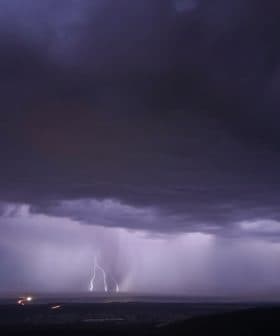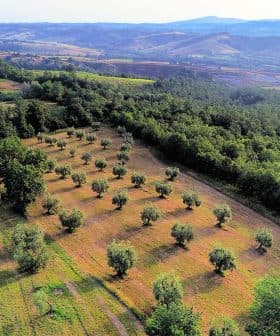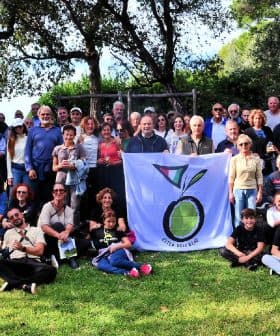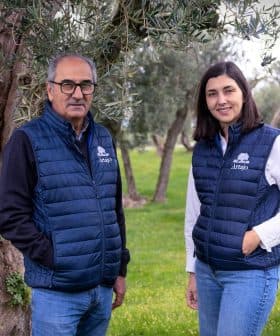A Successful Harvest in South Africa Amid Rolling Blackouts
Power cuts reached a few bleak milestones this year, but the country's producers were undeterred.
 (Photo: De Rustica)
(Photo: De Rustica) Despite facing power cuts and inclement weather, South African farmers produced high-quality extra virgin olive oil during the recent harvest, with the country producing around 1.2 million liters this year. Producers had to work around load shedding and heavy rains, with some farms experiencing poor harvests due to the weather conditions, but overall, the quality of the olive oil made up for the challenges faced during the season.
During the recent harvest, power cuts and inclement weather did not prevent South African farmers from producing extra virgin olive oil of exceptional quality.
Philip King, the vice-chair of the South African Olive Industry Association (SA Olive), told Olive Oil Times that the country produced around 1.2 million liters of olive oil this year.
Everyone had to work around this inconvenience (load shedding) by either getting backup electricity in the form of generators, solar solutions or by changing working shifts. The work had to go on.
“The quality of the 2023 South African extra virgin olive oils made up for the lower crop. The 2022 harvest yielded an estimate of just under 1.7 million liters,” King said. “Numerous producers received the top awards at the most prestigious olive oil competitions worldwide.”
“This is awesome and once again proves that South Africa can produce world-class extra virgin olive oils,” he added.
See Also:2023 Harvest UpdatesKing expected this year’s yield to be down from 2022, which he said was an exceptional year for the country’s producers.
When producers started harvesting earlier this year, it was against unprecedented load shedding (rotational power cuts to prevent a national power grid collapse).
By mid-February, the power outages for 2023 had already exceeded the combined totals of 2019 and 2020, according to data released by the South African Reserve Bank (SARB).
At the time, SARB and other major South African companies started preparing for a grid collapse. This potential catastrophic event sparked national concern; in the event of a nationwide power shutdown, it would take up to two weeks to restart the grid due to its unique topology, which analysts believed could lead to widespread unrest.
As the harvest was in full swing in April, SARB figures indicated that the country had endured 2,434 hours of load shedding for 2023 by the middle of that month.
King described the load shedding during the harvest as a massive challenge. “But as the Afrikaans saying goes, ‘n boer maak ‘n plan,” he said.
“Everyone had to work around this inconvenience by either getting backup electricity in the form of generators, solar solutions or by changing working shifts,” he said. “The work had to go on.”
Besides power cuts, the Western Cape’s farmers – where most of the country’s olive farms are located – experienced heavy rains and severe flooding, resulting in widespread infrastructure damage.
King said the positives of the wet winter far outweighed the negatives for olive farmers, though.
“The positives were that irrigation was hardly necessary during harvesting time, as the whole soil profile has been nourished instead of just the areas around the trees,” he said.
The downside was that rainy days caused harvesting slowdowns, adding to hours lost to load-shedding schedules, but producers took this in stride.
Hedley Manicom, the co-owner of Owl’s Rest Olive and Lavender Farm, located between Robertson and Ashton in the Western Cape, said the rain negatively affected their tonnage and oil yield.
He described the harvest as poor, resulting in a low tonnage of olives, around 70 percent, down from the previous year’s yield.
“The early winter resulted in many olives not ripening,” he said. “We had high losses due to dropping and low yields per ton due to high water content from the wet soil conditions.”
Manicom said the Owls’ Rest team had to work around load-shedding hours. “But the poor harvest made this easier,” he said.
Other factors Owl’s Rest had to contend with were high picking costs due to increased minimum wage and the low yield, which reduced the productivity of the farm’s pickers.
Another producer from Robertson, Brenda Wilkinson, the co-owner of Rio Largo Olive Estate, said their recent harvest involved meticulous daily planning, considering load-shedding schedules, staff requirements, the harvest and the weather.
Despite all this, she described this year as much better than last, with larger volumes and exceptional quality.
Wilkinson told Olive Oil Times that they anticipated a large crop and power outages and started harvesting earlier.
As a result, they yielded a good balance of intense, pungent oils, followed by medium-intensity oils later in the season. This brought in numerous awards for them, she said.
Wilkinson added that they have installed a solar energy system at Rio Largo to support the state utility power.
“With good planning, we were able to operate according to plan without many problems,” she said, “other than an escalation in processing costs.”
Wilkinson added that Rio Largo did not experience too many wet days in the early season.
“So our harvest was uninterrupted by rain, other than the last four weeks of harvest when we had to postpone picking for a good 10 days to allow the groves to dry out and reduce moisture content in the fruit,” she said.
“As I am sure is the case with the rest of the world, escalating costs of labor, fuel, fertilizers and herbicides have negatively affected our production costs, and it is difficult to recover these increases in trade prices of olive oil without reducing volumes sold,” Wilkinson added.
Further east, Kallie Frey, the farm manager for De Rustica Estate, said the harvest went well, adding that their oil yield was four times larger than last year’s.
“I installed a generator set before the harvest started, knowing that load shedding would make it impossible to make the high-quality extra virgin olive oil we usually make,” he said. “It worked well, and thank goodness we did.”
“We have a great team. It makes challenges easier,” Frey added. “The wet winter did cause some delays and had a huge effect on oil yields, but the quality was still very good. We have never complained about rain in the Little Karoo.”
Share this article









